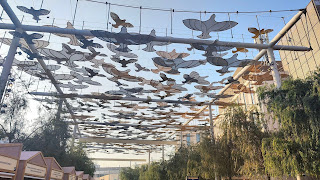Interview with Felix Dodds for Green Earth Citizen
by Fen Wang of Green Earth Citizen
It has been a pleasure for me to get the opportunity to once again interview Mr. Felix Dodds on a few important issues.
Felix Dodds is an independent consultant, focusing on stakeholder engagement in the sustainable development process. He was the Executive Director of Stakeholder Forum for a Sustainable Future from 1992-2012, and is an Associate Fellow at Tellus. He has been active at the UN since 1990, attending the World Summits of Rio Earth Summit, Habitat II, Rio+5, Beijing+5, Copenhagen+5, and the World Summit on Sustainable Development. He has also participated in all UN Commissions for Sustainable Development, and many UNEP Governing Councils. In 2011, he chaired the 64th UN DPI NGO Conference on Sustainable Societies Responsive Citizens feeding into Rio +20. He co-chaired the NGO Coalition at the UN Commission on Sustainable Development from 1997 to 2001. He has written and edited nine books; his latest book, “Only One Earth: the Long Road via Rio to Sustainable Development” (2012) with Michael Strauss and Maurice Strong, covers the last forty years of experience and also the challenges the future holds. He is a member of a number of advisory boards, including the Council of Advisors for theCollaborative Institute for Oceans, Climate and Security, Asia-Europe Foundation – ENV forum Steering Committee, and the Great Transition Initiative. His has a BSc degree in Physics from the University of Surrey.
1. What are the requirements for the future science and technology development in order to achieve new green economy and smart society?
There are many developments in science and technology that will help move towards a more green, fair, and equitable economy and society. The advancements in renewable energy are an example of how technologies, with the right investment, can in a relatively short period accelerate to commercial use. The 2008 financial crisis actually had a positive impact on green technology investments, and so the markets are now more positive to investing there.
There will need to be more incentives put in place for capital market investments, but that, I think, could be secured by the 2015 UN SDG Summit agreeing to a framework for corporate reporting, which would require companies listed on stock exchanges to produce annual sustainable development reports or explain why. The impact would be down the supply chain with innovations, addressing areas such as energy and water use. A lot of the new technologies that are coming on stream are green, but not necessarily socially as good because they will impact on jobs. A just transition, as the trade unions call it, is critical to taking people with us as things change.
2. What needs to be changed in order for the traditional world science and technology to adapt to the new green economy and smart society?
There needs to be a revise of the decline of funding from governments to help innovation in the science community. These innovations should also be patent free if they are funded to pre-development, and therefore available to developing countries to use as well. There needs to be much more interdisciplinary work being done at universities, and particularly in the area of water-food-energy nexus. Universities should find a way of rewarding this, [but] that is not just publishing papers. I do believe the setting up of Future Earth by the science community will have an important impact as we move forward, too.
3. What factors need to be considered for developed states and developing states while making their middle and long-term plans for their science and technology development in order to achieve green economy and smart society?
As is said above, government investment in research is critical in both developed and developing countries. I also think more linkage between the science and technology community and the policy making community is critical. Once the SDGs are agreed in 2015, and the indicators in 2016, then this would offer a national framework in both developed and developing countries that could enable that discourse to happen.
4. How to perfect the policy and legal regulations in order to match the transformation and updating the traditional science and technology, and to achieve the society transition to green economy and smart society?
This will always be a challenge, but the lesson from a lack of regulation for the banks should make it clear that strong regulatory frameworks, or smart regulatory frameworks, are critical. Perhaps we need to think of regulation for good to support public goods, and to drive investment and research around green science and technologies.
5. What would you propose in regard to policy change in order for the world states to layout the science and technology development that matches the society’s transitioning to a green economy and smart society? Please make it specifically to developed states, developing states and less developed states.
I do believe that the SDG framework is a great place to start; it would help ensure all governments are looking at the critical issues that need to be part of a transformational approach, and that will enable twinning, peer group review, stakeholder engagement, and democratization of activities in support of these goals, targets, and indicators. As the SDGs are a universal agenda, it ensures we are working together as one earth, one people.



Comments
Post a Comment